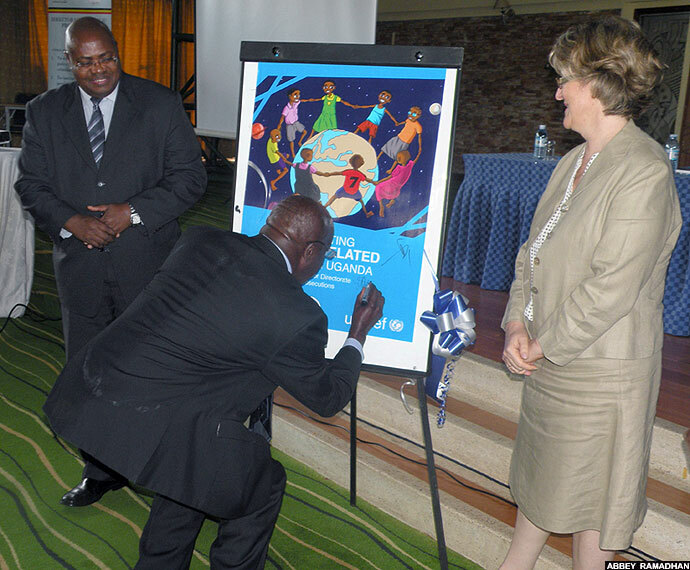Gov't introduces manual on child protection
The manual delves into the subjects of child-friendly justice, diversion, child age discrimination, etc.
PIC: From left, Justice Wilson Masalu Musene, UNICEF Deputy Country Representative Noreen Prendiville, Hon Justice Lwanga, Principal Judge Yorokamu Bamwine, Child Protecting Specialist Sudha Nurali, Judge Suzan Okalanyi, Chief Child Protection Salvia Pash and other judges launching the manual
KAMPALA - The Director of Public Prosecutions (DPP), in partnership with the United Nations International Children's Emergency Fund (UNICEF), have launched a manual on child-friendly justice to protect the rights of children in the courts of law.
The manual contains proposed action in the best interest of children, the need of children without discrimination against particular groups and how to safeguard their lives in court.
The manual delves into the subjects of child-friendly justice, diversion, child age discrimination, detention of children, evidence of children, statement taking and working with child victims and witnesses of sexual and gender-based violence crimes as well as the child justice institutional setup and mandates.
It also provides child justice practitioners with the basic tools of how to handle children in contact with the law.
The volume was launched at Golf Course hotel in Kampala by the Director of Public Prosecutions (DPP) Mike Chibita and Principal Judge Yorokamu Bamwine (pictured below).

The concept requires that children in contact with the law either as victims, witnesses or those in conflict with the law, be handled in a way that is humane and which recognizes their legal and physical vulnerabilities.
The DPP deputy head, Micheal Wamasebu, said the manual was produced to guide prosecutors and other actors in the criminal justice system in handling child-related cases in a child-friendly and gender-responsive manner.
"The handbook is an excellent guide in improving the delivery of justice to children, strengthening child protection structures and helping build a protective environment for children.
"It will lead to the rehabilitation and reintegration of children in conflict with the law," said Wamasebu.
On his part, Chibita said that prior to sentencing, child offenders are held with adults due to lack of separate holding facilities at police stations, which increases the risk of violence, abuse and exploitation.
"The conditions of detention are sometimes sub-standard, overcrowded and deny children their rights such as the right to legal representation, parental access, and appropriate standards of health."
He added that detention rarely results in the child's reintegration and the child assuming a constructive role in the society, which should be the objective of any justice intervention in line with the Convention of the Rights of the Child (CRC).
Chibita also noted that child cases are often processed through justice systems designed for adults which abuses child right and specific needs.

From left, UNICEF's Noreen Prendiville, Principal Judge Yorokamu Bamwine and DPP Mike Chibita at the launch of the manual
According to the Justice Law and Order Sector (JLOS) Annual Report 2013, there were 1,256 juvenile offenders in the year 2011-12. In 2012, the Uganda Police Force arrested an average of six juveniles per 100, 000 of the child population.
Bamwine disclosed that the judiciary has established video links in the High Court to ensure that children of victims do not come face to face with perpetrators in an open court session.
"Determination of child issues has been settled due to the new video link. This will help judicial officers who were stranded."
He cautioned lawyers not to cross-examine children like the way they do adults, saying children deserve special treatment and laws.
"We should not subject child witnesses to the same treatment like adults in open courts which is occupied by so many people including the tormentors. We should come up with innovations to enable access of justice to juveniles."

Here, Hon Justice Wilson Masalu Musene signing on the dummy manual
Meanwhile, UNICEF deputy representative in Uganda, Noreen Prendiville, said the existing and growing understanding of children psychology, needs, behaviour and development is not always sufficiently shared with professionals in the law enforcement area.
She said it is important that the guidelines and directions in the handbook are integrated into institutional capacity building and monitoring of implementations in the field by the directorate.
Prendiville commended the Chief Justice, Bart M. Katureebe, for the excellent progress towards making the judicial system and processes more child-friendly, particularly more accessible, age-appropriate, speedy, diligent and open to adapting itself to addressing the needs of the child.